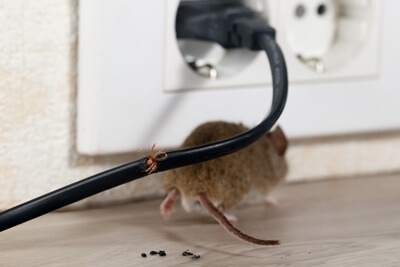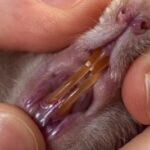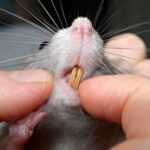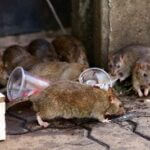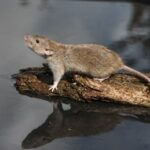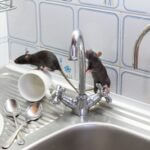Rats can squeeze through tiny holes, providing access to a home’s wiring and power cords. Unfortunately, rats are eager to chew through wires and cables, damaging the conduits.
Rats’ front teeth (incisors) constantly grow, so they wear down any excess growth by gnawing and biting on abrasive wiring.
Chewing is an activity that all species of rodents enjoy. Rodents like the shape of wires, as they’re round and fit comfortably into their mouths.
Rats nest near electrical wiring because electricity provides adults and their pups with warmth.
Unfortunately, when rats chew on wires, they can cause house short-circuiting and fires. Rats aren’t attracted to electricity and can be electrocuted when biting on wires.
Use rodent-resistant cable sleeves, rat tape, and other tools to protect wiring.
Do All Rats Chew Wires?
Rats will chew on wires whenever they can. No rodent avoids wires or dislikes chewing on them. Rats are relentless in their gnawing and biting, making their way through various materials.
Even though electrical wires have no nutritional value and are dangerous to rats, they don’t understand this. Rats will still see them as something fun to chew.
You’ll need to safeguard your electronics and home’s wiring from various household pests.
Why Do Rats Chew Wires?
Rats chew on cables and cords for the following reasons:
Wearing Down Teeth
Rats have long front teeth that never stop growing throughout their lives. To keep their incisors manageable, they’ll chew anything rough and abrasive they can find.
Copper and tin wires are ideal. According to the Proceedings of the Physical Society, these metals are lower on the Mohs hardness scale than a rat’s teeth but provide sufficient abrasion.
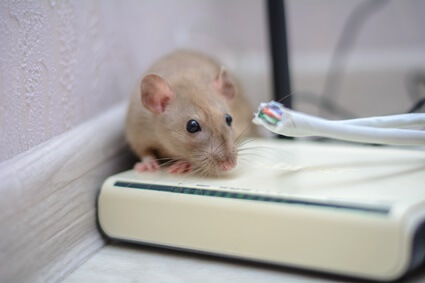
Ideal Shape
Wires are prime candidates for chewing because their circular shape makes them pliable. A cord fits snugly in a rat’s mouth and underneath its teeth.
Availability
The modern home has hundreds of cords, cables, and wires. This applies inside your walls, around your entertainment systems, appliances, and more.
Rats may be attracted to wires because there are lots of them. Since rats are entertained by chewing and need to sharpen their teeth, the availability of cables puts them among a rat’s first choices.
Good Nesting Spots
Bundles of wires tucked out of sight make great nesting spots.
Depending on their location and design, wiring and power chords may provide heat or be located near a heat-producing electrical appliance.
Wires are wrapped together in coils, piled up in heaps, or tied with other cables.
Rats will find electrical wires and cables ideal places for birthing their pups and resting throughout the day. This will likely apply if you find rat bites on cords behind your fridge or washing machine.
Rats may chew apart electric cables to gather materials for their nests.
Ample Privacy
Rats like privacy and spend time foraging in areas or chewing on objects that afford them the most privacy. Many rats live in walls, as there’s a lot of home wiring.
Can Rats Damage Electrical Wires?
Rats grind their teeth on wires until they split open or break, leading to electrical faults that may cause devices to stop working.
Also, chewing on wires damages the surrounding insulation on the cords, exposing wires. If you accidentally make contact with an unsafe wire, this can lead to electrocution.
Wires chewed by rats are more likely to cause sparks when electric currents pass through them. This increases the risk of fire hazards.
Here are the warning signs of wire damage by rats:
Flickering of Lights
If you suddenly notice the lights in your house are flickering on and off, this may signify that rats have damaged the electrical wires.
Circuits Tripping
When rats chew on electrical wires, they damage their structural integrity, leading to:
- Circuit breaker tripping.
- Electrical surges.
- Circuit overload.
Appliance Failures
Certain appliances may cease to function if rats chew on wires and cables.
Can Rats Cause Electrical Fires?
The persistent chewing on wires strips them of the insulation cover, exposing them. When electrical currents flow through them, sparks can cause them to ignite the dry interior of your walls or flammable nearby furniture and items.
Rats also urinate on wires, which can cause them to short-circuit and burst into flames.
According to the National Fire Protection Association, 339,500 home fires were reported in the U.S. in 2019. Of these, 20-25% were caused by electrical damage caused by rats and other rodents.
Can You Rat Proof An Electrical Cable?
Some rats prefer wires because they’re easy to mouth while chewing, so rodent-resistant cable sleeves make it harder for rats to grasp electrical wires.
These cable sleeves also protect electrical wires from:
- Heat damage.
- Abrasions.
- Load damage.
- Impact damage.
Materials commonly used to make the sleeves include:
Polyamide (Nylon)
Polyamide is widely used because it is resistant to scents. If a rodent urinates on or leaves droppings around the wires, the odorous material won’t stick to them.
This makes it difficult for rats to scent-mark and attract others of their kind. Also, these sleeves can withstand high temperatures, making them ideal for industrial and domestic use.
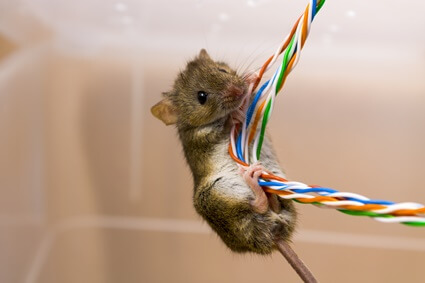
Tin-Copper Wire
Tin-copper wire makes rodent-resistant cable sleeves because it can withstand corrosion.
This prevents rusting. While tin and copper aren’t harder than a rat’s teeth, the tin-copper wire sleeves are woven, so they get stuck between a rat’s teeth when it bites or gnaws.
This ensures a rat can’t access the electrical wires, even if it eats through the sleeving. Tin-copper wire sleeves are heat-resistant, withstanding temperatures of 150-250 degrees Fahrenheit.
Galvanized Steel Wire
Galvanized steel is effective since rats can’t chew through it. These sleeves tend to be cheaper, and they can withstand up to 572 degrees Fahrenheit.
Tin-Copper Wire with PVC Carrier Tubes
PVC is often added to specific tin-copper wire sleeves to provide additional strength against rats’ teeth. PVC is strong yet lightweight, making installing and replacing these sleeves easy.
Furthermore, this material is highly resistant to weathering, abrasion, and rot.
Polyamide Monofil
Polyamide monofil is flexible and durable, making it suitable for rodent-resistant cable sleeves. It’s also heat-resistant, enduring temperatures between 58 and 248 degrees Fahrenheit.
PET Monofiles
PET Monofile cable sleeves work because they’re lightweight and flexible, making them easily pliable around wires. They can withstand temperatures of 58-302 degrees Fahrenheit.
How to Rat Proof Wires
The best way to rat-proof electrical wires is to wrap them up with a rodent-resistant cable sleeve. They can prevent structural damage to your electrical systems and save you money in the long run.
To use these sleeves, wrap them around your cables. The characteristic braiding on most sleeves allows you to manipulate the electrical wires and cables through the sleeves.
Poke the wires through the sleeving so that they pass all the way through. Use the push-and-slide method to drive the cables into the sleeves so that they emerge on the other end.
Alternatively, you can wrap the wires in rodent tape to prevent rats from chewing them. Rodent tape contains substances, such as capsaicin, that repel rats, mice, and other rodents.

